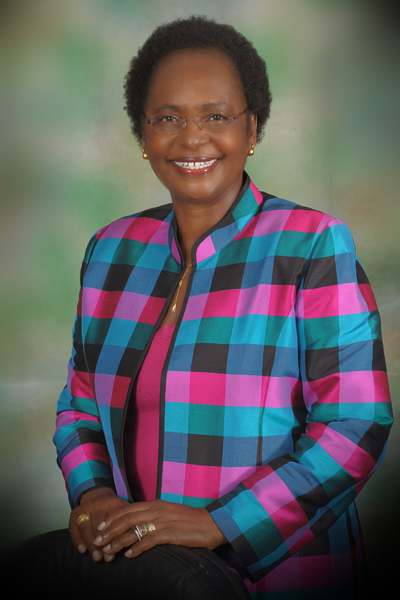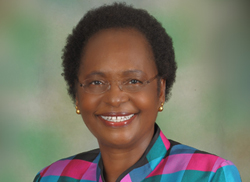
The best way to describe the career and life of the passionate educationist, seasoned diplomat and talented leader that is Kalimi Mworia is in one all-encompassing word: multifaceted. Someone who likes her tea brewed exactly according to the instructions on the packet – steeped in hot water for four minutes and not drowned in milk – is clearly a lover of structure, procedure and order. It’s no wonder that a glance at Ambassador Kalimi Mworia’s Curriculum Vitae tells the story of outstanding achievement in every field she plunges into.
While many an ordinary person might be content to settle for a single profession in the span of their lifetime, Mworia, who started off as a teacher, has excelled in several fields. As one of the first Kenyan women to earn a Bachelor of Education (BEd) from Uganda’s Makerere University, Mworia credits her father for the valuable opportunity to study at the erstwhile premier institution of higher learning. “My father always wanted to study there, but when grandmother fell ill, he had to take care of her,” she says. After Makerere, Mworia introduced and taught A-Level science at Kaaga Girls High School in Meru County. Later, she won a scholarship to the prestigious Ivy League Columbia University in the United States of America. The university’s officials came all the way from the US to interview Mworia and a colleague who had performed equally well at Makerere, but the other girl was about to get married and therefore turned down the opportunity. Mworia also got married, but chose not to forgo a Master of Arts degree in Educational Psychology.
She recalls that before her wedding, she had to seriously consider how pursuing a career and creating a family could coexist. “My father sat us (Mworia and her fiancé) down and asked what we wanted to do. He didn’t want me to abandon the opportunity of going to Columbia.” They decided to go ahead and pursue their plan to be married, but she resolved to finish her Master’s “within the shortest time possible so I could return to my husband.” On her return from studying in the US, the educationist taught for six months at the University of Nairobi before joining a handful of lecturers hand-picked to set up the Bachelor of Education programme at Kenyatta University (KU). At KU, she strove to ensure that girls were not discriminated against for getting pregnant, by insisting that they attend class throughout their pregnancies, even as they became acquainted with the family planning options available to them.
electricians, plumbers, etc, given all the construction work going on and the high demand for maintenance. We can’t all be architects.” For this reason she pursued and secured millions of shillings worth of equipment to cater for technical institutions during her tenure as Kenya’s Ambassador to the Netherlands.
In 1984, Mworia shifted her focus from education to reproductive health. She joined the Family Planning Association of Kenya (FPAK) as Programme Manager, rising to the position of Executive Director three years later. During her tenure, she oversaw the Association’s expansion, especially the construction of its offices off Langata Road. Her administrative and financial acumen then saw her appointed Director of the 75-million dollar Partnership Challenges Fund/Vision 2000 Fund in 1993 through 1994 at the International Planned Parenthood Federation (IPPF) office in London, later rising to become IPPF Africa’s Associate Regional Director in 1995. Three years later, Mworia was appointed Associate Technical Adviser by the Eastern and Southern Africa Partners in Population & Development, which was co-funded by the United Nations Population Fund (UNFPA) and the Rockefeller Foundation.
Mworia traces her interest in reproductive health to 1970 during her final year at Makerere University. She convinced their mzungu matron to house a Kenyan student’s new-born baby so she could finish her exams while Mworia and fellow Kenyan schoolmates took turns to babysit. The baby apparently came earlier than expected due to what Mworia suspects was exam stress. “The labour pains started when she was writing her second-last paper, but she was brave, finished it, and then we rushed her to hospital.” As a Kenyatta University lecturer, she used the Makerere experience to convince the administration to retain expectant mothers instead of sending them away for six months, forcing them to repeat an academic year. “The only challenge we could not overcome was with expectant mothers studying Physical Education (PE), because it was difficult for them to do the practicals,” she laughs.
Mworia decided to deal with the challenge more proactively by bringing in family planning groups to address First Year students on contraceptive options, a move she admits was controversial in those days.
In 2001, Mworia joined the Africa Medical and Research Foundation (AMREF) as the International Training Co-ordinator before being appointed Acting Director of International Training and Development in Sub-Saharan Africa in 2004. She regrets that she had not yet been confirmed to the job, “as I had so much left to do,” by the time President Mwai Kibaki appointed her Kenya’s ambassador to the Netherlands and the Czech Republic. “I was under the drier at a salon when a former colleague called to tell me that she had heard on the radio that I had just been appointed ambassador. I just couldn’t believe it.” As Ambassador, Mworia also represented the country at the International Criminal Court (ICC) in The Hague and at the Organisation for the Prohibition of Chemical Weapons (OPCW), which is charged with implementing the UN Chemical Weapons Convention. Between March 2007 and December 2011, she took up the position of Director of International Cooperation and Assistance at the OPCW. She was the first and only woman among 10 directors. The OPCW won the 2013 Nobel Peace Prize.
Mworia attributes her success at the OPCW to the chemistry she studied at Makerere and to her lobbying during her tenure as Kenya’s ambassador to the Netherlands and the Czech Republic between May 2004 and February 2007. With 50 registered members, Africa has the most members in the 188-member OPCW. “I thought it only fair that we build the continent’s capacity to deal with chemical weapons,” she says.
Words of Wisdom
“Don’t work because you are afraid of your boss. Work knowing that God can see you.”
“Always strive to leave a place better than you found it.”
“Do what is right and have confidence in yourself.”
“It is fulfilling to empower others through mentorship or just offering a helping hand.”
As Ambassador, Mworia was shocked to walk into an Embassy whose phone lines were disconnected due to unpaid bills, but whose staff were overpaid. “I remember looking at my pay cheque that first month and getting shocked. I was supposed to be paid in dollars, but instead the cheque read Euros – a practice I discovered was widespread.”
She alerted the Foreign Affairs Ministry of the malpractice and proceeded to remedy the situation, going over the books, setting up reimbursement plans and even developing a budget. “Can you believe they didn’t have one? They just kept adding 10 per cent every year,” – a faux pas that wouldn’t fly in the Non-Governmental Organisation (NGO) world in which she had previously managed donor millions.
In April 2012, President Kibaki appointed her as chairperson of the Kenya Citizens and Foreign Nationals Management Service Board on the recommendation of the Public Service Commission (PSC), a position she holds to date. The Board was previously under the Ministry of Immigration and Registration of Persons, which became the Ministry of Interior and Coordination of National Government when Uhuru Kenyatta became President in 2013. “As an ambassador, I had dealt with matters immigration,” she explains; hence this appointment. As Board Chairperson, Mworia would like to see every Kenyan assigned something akin to a social security number. During the interview for the job, she told PSC panellists of her intention to register all births and give every individual a unique number that would be on the birth and death certificates as well as on the ID. She explains that among other functions, such a number would help address electoral fraud where dead people’s IDs are used to beef up certain candidates’ votes.
“We’re going to digitise all our kipandes (IDs) and everything will have that number,” Mworia says, adding that the project would be undertaken in conjunction with the ICT Authority and with the President’s blessing. Mworia has been awarded the Presidential Moran of the Burning Spear (MBS) and the Elder of the Burning Spear (EBS) honours in recognition of her services as an envoy and with the OPCW.
The mother of four and grandmother of five is also a farmer who finds time for Bible Study. She is very particular about how her cup of tea is brewed, a trait that speaks volumes about her approach to life and work. It should infuse exactly according to the packet instructions: for about four minutes in hot water – and not drowned in milk… The retired Ambassador praises her husband for helping her juggle the roles of wife and mother, on top of the various high profile jobs she has held. “He supported my jobs. He even supported my going abroad with the children without him, because we made the decision that it was not good for him to leave his job,” she says. When their children were in school, Mworia and her husband ensured that they spent some time in their rural home during school holidays to connect with their roots. “It was also our policy that they learn Kimeru.”
Growing up, Mworia looked up to her father who was a teacher in Kaaga in Meru where she grew up at the height of the emergency period. She is glad she has been able to serve her country well locally and internationally. As a child, her sense of patriotism peaked when she witnessed the horrors colonialists inflicted on Mau Mau freedom fighters.
“On a number of occasions, they bundled us out of school to witness dead bodies being offloaded from trucks. I’ve never forgotten the experience of watching them remove a severed head followed by the body.” The educationist-cum-diplomat says her BEd opened the world to her and contributed to her success in the various fields, where information dissemination is critical. Mworia initially wanted to study veterinary medicine. “My father asked me to think it over carefully as it would mean moving from place to place and that could pose a challenge when I got married.” Although she heeded his advice, ironically she still ended up working far from home for a considerable numberof years.
Now that she is involved in farming, she is closer to her original dream. “When I handed in my resignation to the OPCW Director General, he asked me what I was going to do. I said I’d be busy talking to plants and animals!”
Mworia later moved to the Kenya Technical Teachers’ College as an administrator and from there to the Kenya Polytechnic, whose mandate she strongly believes in. “I think it was a mistake to turn so many of these institutions into universities. We need qualified
